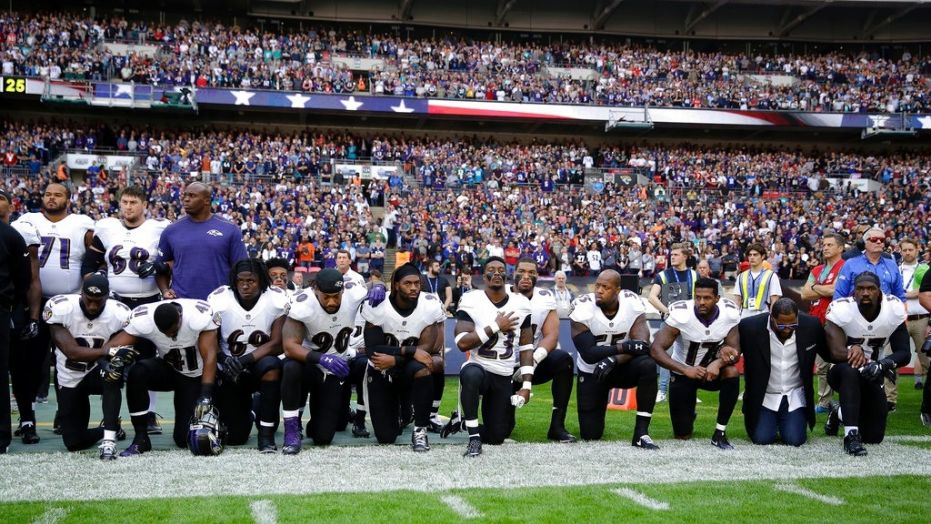As we all know, rather than dealing with his administration or helping the people in Florida, Texas, or Puerto Rico our president decided to speak about the “controversy” of football players kneeling at the American flag rather than the “traditional” (post WWII) hand over the heart. Before WWII American children saluted the flag as shown in the picture below.
Now more players than ever are kneeling at the American flag to protest the president than to protest what others were last year.
Is there at law saying one must stand for the National Anthem? No. In West Virginia State Board of Education v. Barnette (1943) the Supreme Court of the United States ruled that choosing not to salute the flag or say the Pledge of Allegiance was a freedom we have due to the First Amendment.
Justice Robert Jackson said in the brief that a flag is a “primitive but effective way of communicating ideas,” and explained that “a person gets from a symbol the meaning he puts into it, and what is one man’s comfort and inspiration is another’s jest and scorn.” Jackson warned in the same brief believing that the flag brought unity that “[t]hose who begin coercive elimination of dissent soon find themselves exterminating dissenters. Compulsory unification of opinion achieves only the unanimity of the graveyard.” Jackson asserted at the end
The very purpose of a Bill of Rights was to withdraw certain subjects from the vicissitudes of political controversy, to place them beyond the reach of majorities and officials and to establish them as legal principles to be applied by the courts. One’s right to life, liberty, and property, to free speech, a free press, freedom of worship and assembly, and other fundamental rights may not be submitted to vote; they depend on the outcome of no elections.
Justice Jackson also added:
The case is made difficult not because the principles of its decision are obscure but because the flag involved is our own. Nevertheless, we apply the limitations of the Constitution with no fear that freedom to be intellectually and spiritually diverse or even contrary will disintegrate the social organization. To believe that patriotism will not flourish if patriotic ceremonies are voluntary and spontaneous instead of a compulsory routine is to make an unflattering estimate of the appeal of our institutions to free minds. We can have intellectual individualism and the rich cultural diversities that we owe to exceptional minds only at the price of occasional eccentricity and abnormal attitudes. When they are so harmless to others or to the State as those we deal with here, the price is not too great. But freedom to differ is not limited to things that do not matter much. That would be a mere shadow of freedom. The test of its substance is the right to differ as to things that touch the heart of the existing order.
If there is any fixed star in our constitutional constellation, it is that no official, high or petty, can prescribe what shall be orthodox in politics, nationalism, religion, or other matters of opinion or force citizens to confess by word or act their faith therein. If there are any circumstances which permit an exception, they do not now occur to us.
The flag is not America and America is not its flag. We are a group of people who have chosen to live together under a set of laws and principles. Look at our Bill of Rights and read Justice Jackson’s words and you will see what it means to have freedom of speech.




























